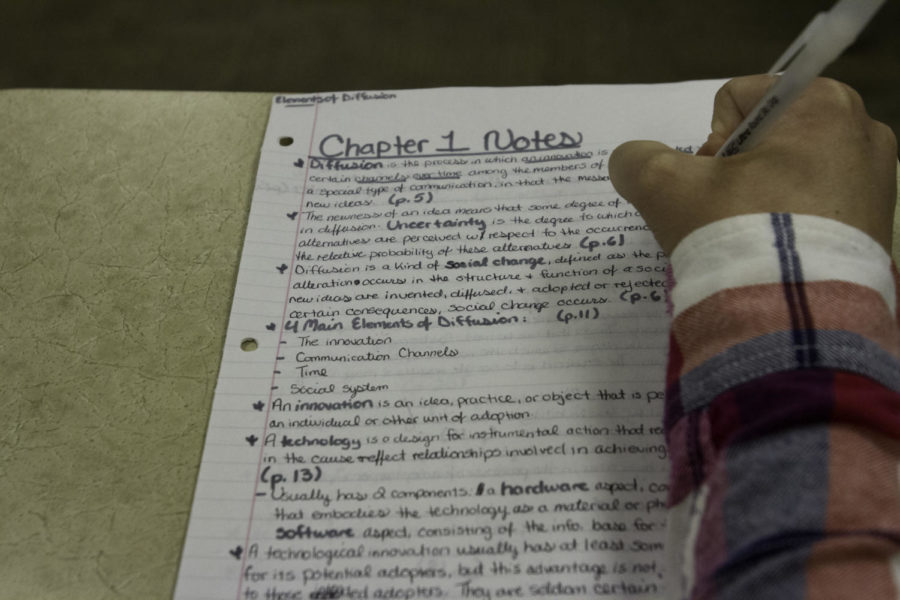Diwate: Writing it off?
Photo: Megan Wolff/Iowa State Daily
Opinion: Diwate 9/4
September 3, 2012
When was the last time you wrote? To be more specific, wrote with a pen? Most likely, you handed in a print-out of your latest assignment; you took notes on your laptop in class; you took your last test by filling out bubbles; you texted your friend; and possibly you signed off the little credit card payment slip with an electronic pen and screen. Maybe you are not alone. According to a survey, the average adult wrote with a pen 41 days ago. Some people now may not know how their handwritten notes look or if their handwriting can be understood by others.
Writing has been a milestone in human history, which helped man to accurately record his experiences over a period of time. The human civilization has written by hand for the majority of its existence. Initially, even books were handwritten for the fortunate few who could read and afford them. The invention of the printing press helped the mass production of written material. The invention of typewriters and later computers mechanized the aspect of personal writing. But today we see the humble pen and paper is mostly used only for scribbling notes, filling out random forms or signing printed documents.
One may wonder if it really makes a difference to write using a pen. The answer, surprisingly, is yes. At least, it makes a difference to the learning capacity of a college student. Some psychologists say a person learns more effectively by writing than typing. Taking notes in class by hand helps the brain to organize new important information. According to research, writing stimulates a bunch of cells called the reticular activating system. In turn, this increases our focus on learning the material.
Writing by hand is a complex skill involving coordination between various organs and greater brain engagement. I have seen some students who start writing on their laptops and become quite habituated to the automatic spell and grammar checks. It becomes an arduous task for such students to write on a paper with correct spelling and punctuation. I wonder about those who lug laptops around to their classes. Isn’t carrying a pen and notepad more convenient than a laptop? There is also the possibility that you may get distracted while taking “notes” during class as the Internet browser is just a click away.
Interestingly, according to a report by the Daily Mail, there has been a rise in the sale of luxury pens. Classic fountain pens are in higher demand. So, at a time when we are writing less, people who can afford to are spending more on high-end writing instruments. Definitely, prestige value outstrips utility for luxury items.
People whose bread and butter depends on writing, such as writers, have different views on this topic. Some tech-savvy writers are quite used to directly typing on a keyboard. For such people, typing brings about a great flow in ideas during writing, which might be a good way to stay away from writer’s block. Eventually, a writer’s script has to be electronically submitted to an editor. For some, typing is faster and helps to create a better link with ongoing thoughts. However, some still prefer the good old pen and paper. Renowned author Stephen King calls his Waterman fountain pen “the world’s finest word processor.”
It is not only about utility but also about emotions attached to a pen and paper. Think about a fully printed greeting card you receive from your friend. Doesn’t seem very appropriate, right? The personal touch of a greeting card seems to be lost. On digging through your old school treasure trove, you may find a hand-written paper. A piece of paper written years ago by you is something quite close to you. You try to notice the difference in your handwriting. It’s not quite the same with documents stored on the “cloud” or a printed paper.
It boils down to the individual’s choice, but we must remember writing by hand is a wonderful human skill we must work to preserve even in the age of laser printers and key boards. We love crisp uniform word documents just as we love a handwritten page in bold cursive.







